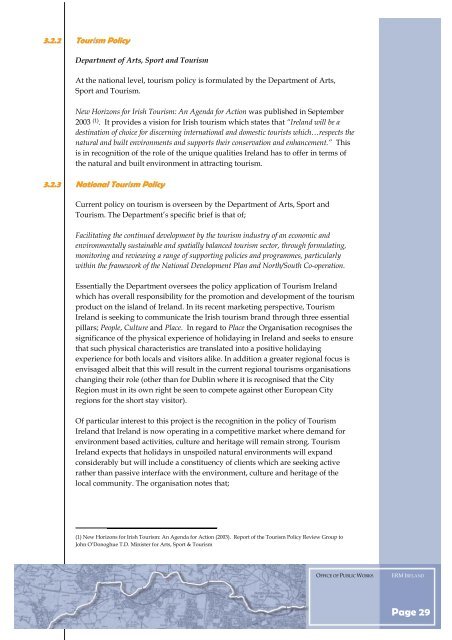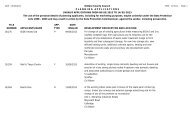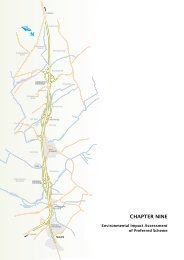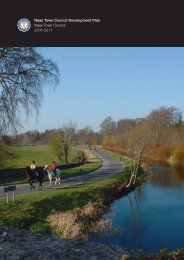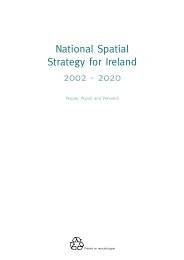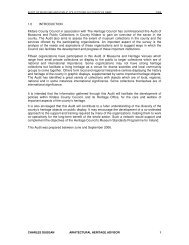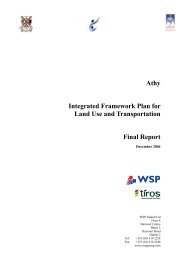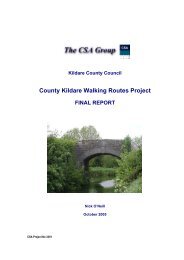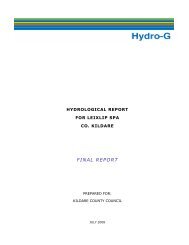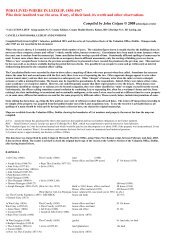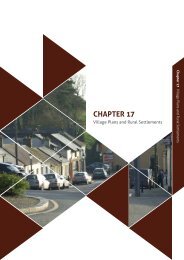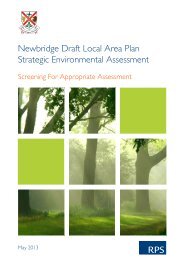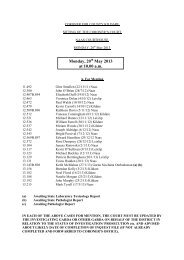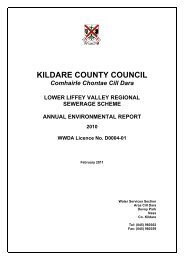Towards a Liffey Valley Strategy Doc. 1 - Kildare.ie
Towards a Liffey Valley Strategy Doc. 1 - Kildare.ie
Towards a Liffey Valley Strategy Doc. 1 - Kildare.ie
You also want an ePaper? Increase the reach of your titles
YUMPU automatically turns print PDFs into web optimized ePapers that Google loves.
33.. 22 .. 22 TToouurrissmm i PPoolliiccyy<br />
Department of Arts, Sport and Tourism<br />
At the national level, tourism policy is formulated by the Department of Arts,<br />
Sport and Tourism.<br />
New Horizons for Irish Tourism: An Agenda for Action was published in September<br />
2003 (1) . It provides a vision for Irish tourism which states that “Ireland will be a<br />
destination of choice for discerning international and domestic tourists which…respects the<br />
natural and built environments and supports their conservation and enhancement.” This<br />
is in recognition of the role of the unique qualit<strong>ie</strong>s Ireland has to offer in terms of<br />
the natural and built environment in attracting tourism.<br />
33 .. 22 .. 33 NNaatt ii oonnaall TToouurrissmm i PPoolliiccyy<br />
Current policy on tourism is overseen by the Department of Arts, Sport and<br />
Tourism. The Department’s specific br<strong>ie</strong>f is that of;<br />
Facilitating the continued development by the tourism industry of an economic and<br />
environmentally sustainable and spatially balanced tourism sector, through formulating,<br />
monitoring and rev<strong>ie</strong>wing a range of supporting polic<strong>ie</strong>s and programmes, particularly<br />
within the framework of the National Development Plan and North/South Co-operation.<br />
Essentially the Department oversees the policy application of Tourism Ireland<br />
which has overall responsibility for the promotion and development of the tourism<br />
product on the island of Ireland. In its recent marketing perspective, Tourism<br />
Ireland is seeking to communicate the Irish tourism brand through three essential<br />
pillars; People, Culture and Place. In regard to Place the Organisation recognises the<br />
significance of the physical exper<strong>ie</strong>nce of holidaying in Ireland and seeks to ensure<br />
that such physical characteristics are translated into a positive holidaying<br />
exper<strong>ie</strong>nce for both locals and visitors alike. In addition a greater regional focus is<br />
envisaged albeit that this will result in the current regional tourisms organisations<br />
changing their role (other than for Dublin where it is recognised that the City<br />
Region must in its own right be seen to compete against other European City<br />
regions for the short stay visitor).<br />
Of particular interest to this project is the recognition in the policy of Tourism<br />
Ireland that Ireland is now operating in a competitive market where demand for<br />
environment based activit<strong>ie</strong>s, culture and heritage will remain strong. Tourism<br />
Ireland expects that holidays in unspoiled natural environments will expand<br />
considerably but will include a constituency of cl<strong>ie</strong>nts which are seeking active<br />
rather than passive interface with the environment, culture and heritage of the<br />
local community. The organisation notes that;<br />
(1) New Horizons for Irish Tourism: An Agenda for Action (2003). Report of the Tourism Policy Rev<strong>ie</strong>w Group to<br />
John O’Donoghue T.D. Minister for Arts, Sport & Tourism<br />
OFFICE OF PUBLIC WORKS ERM IRELAND<br />
Page 29


